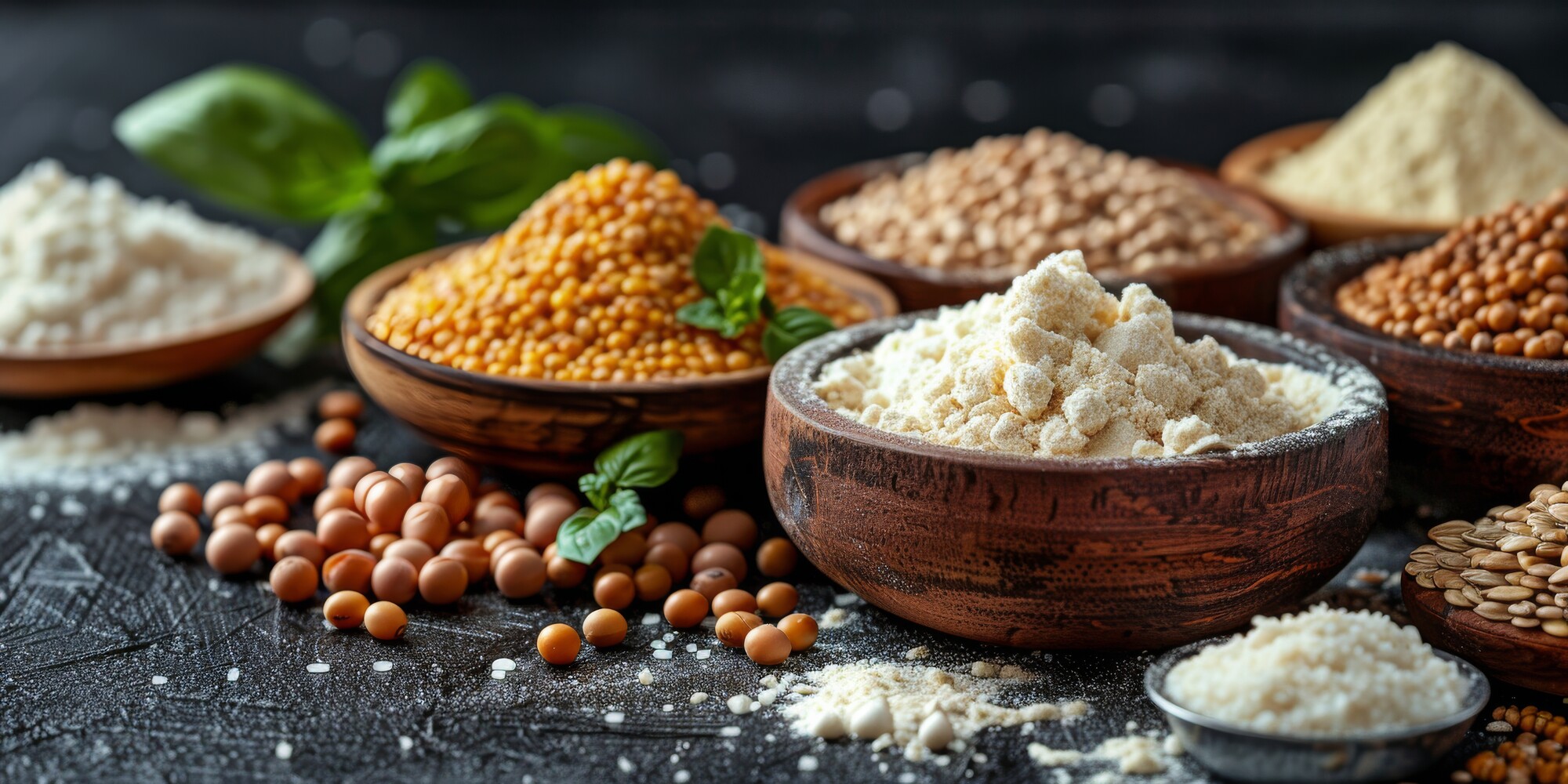The path to a healthier future?
Nutrition is one of the big issues of our time - it combines three central and complex topics: health, climate and animal welfare. The vegan diet has emerged as a beacon of hope for a healthier approach to ourselves, the planet and animal husbandry. We examine the advantages and disadvantages of this diet and also take a look at the current research situation. Evidence and quality of studies play a major role.
1. Vegan diet - a definition
A vegan diet excludes all animal products. This includes meat, fish, eggs and dairy products such as yogurt, cheese and milk. Some vegans also avoid honey and - regardless of diet - everyday products made from leather and wool.
2. Pros and cons of a vegan diet
The topic of vegan nutrition has many facets. Depending on the choice of food, a vegan diet can be very healthy, but possibly also unhealthy. There is also still a lack of so-called "randomized controlled trials" (RCTs) on this diet. However, below are some basic considerations that can help you decide for or against it.
The German Nutrition Society (DGE) formulated its assessment of the vegan diet last year in a new and more positive way than before: "Carefully designed, a vegan diet can be beneficial to adults' health." When it comes to vulnerable population groups such as children, adolescents, pregnant women and the elderly, the DGE remains neutral, it does not speak out for or against strictly vegan food.
Since animal foods contain a number of nutrients that are more difficult to obtain through a purely plant-based diet, vegans have to pay close attention to the composition of their daily meals. Alongside carbohydrates and fats, these proteins form the most important group of nutrients. They are needed for cell growth. Muscles, bones, skin and organs are largely made up of proteins. They also enable many metabolic processes and are part of the immune system.
During digestion, both animal and plant proteins are first broken down into their components, i.e. into the individual amino acids. This allows the organism to absorb them. In total, the body needs 20 different amino acids to be able to put together all the important proteins, nine of which the body cannot produce itself. They must be ingested through food. This requires conscious planning with plant proteins.
2.1. The benefits of a vegan diet
2.1.1. For your own health
In most affluent nations, the proportion of overweight people is now over 55 percent - and the trend is rising. In Germany, one in six children is overweight. The number of calories consumed daily is therefore more than the daily requirement for many. Severe obesity has a negative impact on life expectancy. A vegan diet with a high proportion of fiber from fruit, vegetables and legumes can help to significantly reduce calories and thus counteract the negative trend.
People at high risk of heart attack and stroke benefit from plant-based diets. High cholesterol levels
can be significantly reduced if they eat a vegan or vegetarian diet. This is the result of a review by Danish doctors who evaluated studies from four decades up to 2022.
Animal protein sources such as meat, eggs and dairy products also allow saturated fats and cholesterol to enter the body. Vegan protein sources offer a clear advantage here. At the same time, they provide fiber and more vitamins. The emphasis on "plant-based" is crucial here - less so whether the diet is strictly vegan.
But the health benefits of avoiding meat still need to be researched further. The results so far show a weak to moderate connection between regular consumption of red, processed meat and these diseases. Many nutrition societies therefore recommend a reduced consumption of red meat. These study results and recommendations do not refer to poultry and fish.
There is evidence that a vegan diet is beneficial when it comes to cancer incidence. Blood lipid levels such as HDL, LDL and total cholesterol as well as blood sugar also develop positively with this diet.
Foods with a high glycemic index (GI) can raise blood sugar levels and thus contribute to diabetes mellitus and cardiovascular disease. In a vegan diet, replacing carbohydrates with a high GI - such as in white rice, pizza or pancakes - with foods with a low GI - such as in fruit and vegetables - can have very positive effects on health.
| Glycemic index of carbohydrate foods | |
|---|---|
High GI foods | |
Glucose | 100 |
White rice | 87 |
Potatoes, boiled | 78 |
French fries | 75 |
White bread | 73 |
Watermelon | 72 |
Medium GI foods | |
Wholemeal bread, fine | 70 |
Sugar | 68 |
Raisins | 64 |
Mulose bars | 61 |
Basmati rice | 58 |
Oatmeal | 55 |
Low GI foods | |
Wholemeal bread, whole grains | 52 |
Boiled potatoes | 50 |
Carrots | 47 |
Apples | 38 |
Spaghetti al dente | 38 |
Lentils | 30 |
There are other health-related reasons that speak in favor of a vegan diet:

2.1.2. For Planetary Health
In the climate crisis, planetary and human health must be considered together. This is also the focus of the relatively new research field of Planetary Health. Our dietary choices not only have a direct impact on our own health, but can also ensure a healthier planet.
The WHO's nutritional recommendations largely coincide with the considerations for a diet that is sustainable for the planet. A healthy and sustainable diet therefore consists of an appropriate calorie intake with numerous plant-based foods, only small amounts of animal products, more unsaturated than saturated fats and as little sugar, convenience products and refined grains such as white flour as possible.
Since 2021, the DGE has also taken into account the consequences for the environment, animal welfare and social aspects in addition to health aspects in order to define a sustainable diet. A vegan diet is often environmentally friendly because it helps to reduce the environmental impact of the food system. Therefore, a diet with a significant reduction in animal products is recommended, explains the DGE. However, regionality plays a central role here. Because the flown-in avocado may be vegan, but in the end it is anything but sustainable.
2.2. The disadvantages of a vegan diet
The body can process proteins particularly easily if their structure is similar to human proteins. This so-called bioavailability is particularly evident in proteins from animal products. There are some vegan protein sources that can keep up with animal proteins, but the majority are inferior. Possible disadvantages of a vegan diet can arise if the change is made without information. A vegan diet can also lead to potentially poorer bone health and therefore a higher risk of bone fractures.
2.2.1. Vegan foods can also be unhealthy
A person could live a completely vegan lifestyle and still endanger their own health with chips, cola, etc. Sugar, white flour, convenience foods, saturated fatty acids, alcohol, or salt have a negative effect on health if consumed in excess.
Vegan meat substitutes are also often advertised with health and climate promises and are now available in most supermarkets. The sometimes long list of chemical ingredients deserves attention. This sometimes includes, for example, the binding agent methylcellulose, which is the basic substance of wallpaper paste. In 2022, the magazine Ökotest was able to detect traces of mineral oils in vegan cold cuts, and in 2023 also in burger patties. In addition, there is often an increased and therefore harmful salt content.
2.2.2. Potential deficiency in the vegan diet
Another, but avoidable, problem with the vegan diet is the risk of deficiency symptoms. The average European consumes too much meat and dairy products, but they also contain important nutrients. If you completely avoid them, these must be obtained from other food sources.
Avoiding deficiency symptoms
The five most important nutrients are iron, vitamin B12, vitamin D, calcium and protein iron
Meat contains a lot of iron, but plant sources contain a less easily absorbed form. Vegans are therefore at increased risk of iron deficiency - especially if there is further iron loss (e.g. due to heavy menstrual bleeding). Daily consumption of plant sources of iron such as nuts, seeds, sunflower seeds, raisins, spinach, peas or legumes such as beans, lentils and chickpeas and also fortified cereals is therefore particularly important.
Vitamin B12
The situation is similar with vitamin B12, except that it is more difficult to replace it with plant-based sources. If you follow a strictly vegan diet, daily substitution is therefore advisable.
Vitamin-D
As vitamin D is found more frequently in animal products such as oily fish (salmon, mackerel, sardines), meat and egg yolk, this vitamin should be taken during the dark season. This is because when there is little sunlight, the vitamin is often not sufficiently produced through the skin.
Calcium
Calcium can be obtained through daily consumption of calcium-containing orange juice, tofu, beans, dark, green leafy vegetables, almonds and soy, oat or almond milk. The poor ecological balance of almonds should be mentioned at this point.
Protein
A sufficient protein intake can easily be achieved by increasing the consumption of pulses, soy-containing products such as soy milk or tofu, nuts and various types of grain. Since plant proteins are usually incomplete proteins (they lack one or more essential amino acids), you should consume a variety of plant protein sources. If you want to live a vegan lifestyle, you need a wide variety of foods.
2.2.2.1. Studies
The Federal Institute for Risk Assessment (BfR) has been involved in the COPLANT study since 2023. Over the next 20 years, it will investigate how a vegan diet affects health. It is the largest study on plant-based nutrition in German-speaking countries to date.
Basically, it is crucial to cover all relevant micro and macronutrients in your daily diet. Otherwise, deficiency symptoms can occur, as a Finnish study showed, for example. It turned out that the vitamin D intake of vegans in northern latitudes was on average insufficient to cover their needs during the winter months. It shows again how important personal responsibility and attention to detail are.
2.2.2.2. Symptoms
What symptoms does a vegan person develop when they are deficient? It depends on which micro or macronutrient was consumed too little. Depending on the vitamin deficiency, the following symptoms are possible:
- Vitamin D: skeletal pain and bone deformities
- Folic acid: anemia
- Vitamin B12: anemia and neurological damage
3. Nutrients & vitamins in a vegan diet
There are nutrients and vitamins that should definitely be part of the diet - regardless of whether someone is vegan or not. This includes a balanced ratio of the so-called macronutrients made up of carbohydrates, proteins and fats, sufficient consumption of fiber and adequate consumption of certain micronutrients such as sodium, calcium, vitamin D, folic acid and other vitamins.
3.1. Macronutrients
Carbohydrates should make up 45 to 65 percent of daily calorie intake. Depending on their glycemic index (GI), they have a varying effect on blood sugar levels. Plant-based carbohydrate sources with an average lower GI are preferable to those with a high GI.
Proteins should make up 10 to 35 percent of daily calorie intake. As explained above, vegans rely on a particularly wide variety of foods in order not to fall into a deficit.
Fats should make up 20 to 35 percent of daily calorie intake. The type of fat is crucial: saturated fats (dairy products such as cheese, milk, ice cream and red meat) and trans fats (fast food, margarine, commercially available baked goods such as sweet rolls, cookies, donuts) are generally unfavorable for health. Unsaturated fats (nuts, seeds and vegetable oil-based oils and spreads), on the other hand, are desirable.
Since vegans avoid important sources of unsaturated fatty acids such as fish, these should be obtained from rapeseed, soybeans, linseed, wheat germ, brassica vegetables, sunflower, walnut or corn oils.
Fiber is also considered a macronutrient in the broader sense. It should also be part of your daily diet in large quantities. It is the component of plant-based foods that cannot be digested in the gastrointestinal tract. Fiber-rich superfoods include fruits, vegetables, legumes and nuts. The many health benefits of a fiber-rich diet include a lower risk of cardiovascular disease, colon cancer, strokes and type 2 diabetes.
3.2. Micronutrients
Nutrients that are only needed in small amounts are called micronutrients. These include sodium, calcium, folic acid, vitamin D and other vitamins.
There is a risk of consuming too much sodium. Highly salted meals can lead to exceeding the daily recommended limit of 2300 mg and thus contribute to the development of cardiovascular diseases. Ready-made products in particular are unhealthy due to their high salt content. This also applies to vegan ready-made products.
The most important minerals, trace elements and vitamins include:
|
Macrominerals (requirement of >100 mg/day) |
Trace elements (requirement of 1-100 mg/day) |
Vitamins |
|---|---|---|
Calcium | Copper | Water-soluble (e.g. Vit B1, B2, B3, B6, B12, folic acid, Vit C) |
Chloride | Copper | Fat-soluble (Vit A, D, E, K) |
Magnesium | Iron | |
Phosphorus | Fluoride | |
Potassium | Manganese | |
Sodium | Zinc |
As mentioned above, deficiencies are not to be expected with a vegan diet as long as the diet is varied, contains plenty of fruit and various vegetables and certain rules are followed in the case of iron, vitamin B12, vitamin D and calcium.
4. Vegan diet plan
4.1. Vegan diet for beginners
Anyone who starts a vegan diet should be aware of their motivation for changing their diet. Are they purely for health reasons? Does climate protection play a role? Are ethical considerations about animal husbandry predominant? Do you want to lose weight or do you have a specific illness? This is not to say that one reason is superior to the other. However, the nutritional recommendations can vary depending on which aspect is the most important.
According to current studies, anyone looking for the absolute health benefits should definitely live a plant-based lifestyle, but not necessarily a vegan lifestyle. If the climate is of particular concern, however, you need to keep an eye on water consumption, transport and the heating of greenhouses when buying food. While it is particularly important for people with illnesses to discuss diet plans with their doctors.
If you are changing your diet completely to vegan, the vegan food pyramid can help as a guide.
4.2. Vegan food pyramid
The vegan food pyramid is a model that shows how plant-based foods can be optimally combined. The aim is to ensure a balanced intake of macro and micronutrients. Sufficient sugar-free liquids form the basis of the vegan food pyramid. Vegetables and fruit form the second largest foundation.

No plant-based food covers all essential proteins. Proteins are made up of amino acids. A diverse combination of foods can also achieve a complete amino acid profile in a vegan diet.
As you go up the pyramid, the foods do not become less important, only the necessary consumption amount is lower. The top with snacks, sweets and alcohol is not to be understood as a recommendation, but optional. From a medical point of view, less is more here.
There are many quantities of the individual pyramid components available on the Internet, but daily calorie requirements can vary considerably from person to person. The requirement depends on factors such as age, gender, weight and personal activity level.
It is advisable to see the individual pyramid components in relation to one another, to keep an eye on your own weight and to seek professional advice at regular intervals if you are on a strictly vegan diet. In addition to the components of the pyramid, vitamin B-12 supplementation, the sparing use of iodized table salt and vitamin D intake in months with little sun are recommended.
4.3. Vegan protein sources
Proteins are one of the most important nutrients. If you avoid animal products, you can prevent a protein deficiency by ensuring you get enough protein from plant-based protein sources. Legumes, soy-containing products such as soy milk or tofu, nuts and various types of grain are particularly suitable.
Important: Since many plant-based proteins are so-called incomplete proteins that lack one or more essential amino acids, you should never consume just one plant-based protein source.
5. Vegan diets for illnesses
There are numerous promises of healing through a vegan diet circulating on the Internet. Although a balanced, plant-based diet is associated with significant health benefits, there are not yet enough randomized controlled trials (RCTs) in medical research that confirm that a purely vegan diet is superior to other diets.
But a vegan diet is already considered advisable for high blood pressure, obesity and to reduce the risk of diabetes. It is also recommended for treating diabetes and for reducing the risk of cardiovascular complications in people with type 2 diabetes mellitus.
When it comes to meat, the results are less clear. Numerous studies do indicate that red, processed meat has adverse health effects. But these are primarily epidemiological observational studies. Statistically, there is only a weak to moderate connection between regular consumption of red, processed meat and diseases such as type 2 diabetes, strokes, colon cancer and cardiovascular disease. Nevertheless, many nutrition societies recommend reducing the consumption of red, processed meat based on the studies. However, this does not apply to poultry and fish.
5.1. Intestinal health
A healthy diet has been shown to have a positive effect also on intestinal health. Nutrition is an important tool that can be used to reduce health risks.
To prevent cancer, for example, the American Cancer Society recommends a diet of whole grain products, fruit and a variety of vegetables (dark green, red and orange vegetables, legumes and others) and advises avoiding red, processed meat, sugar-sweetened drinks, highly processed foods and white flour products. A vegan diet can take all of these recommendations into account and thus reduce the overall risk.
For colon cancer in particular, numerous studies have found a connection with the consumption of red, processed meat. Cooking at high temperatures (e.g. when grilling or frying in a pan) can further increase the risk. Studies also suggest that in the case of chronic inflammatory bowel disease, plenty of fiber and a reduction in animal fats have a positive effect.
6. Vegan diet during pregnancy
The DGE (German Nutrition Society) neither recommends nor advises against a vegan diet for children, adolescents, pregnant women, breastfeeding women and the elderly. This is largely due to insufficient data. If people from these vulnerable population groups decide to adopt this diet, they should have sound nutritional skills and should also be accompanied by nutritional advice. Women who want to have children should also discuss this in detail with a doctor or nutritionist beforehand.
6.1. Studies
There is currently a lack of high-quality studies on the topic of vegan nutrition during pregnancy. However, so-called "systematic reviews" can provide guidance. These are overviews that summarize the existing evidence from all relevant, currently available studies.
A review from 2019 came to the conclusion that a vegan diet depends on the details if it is to be healthy for mother and child. This is particularly shown by studies from poorer countries, where pregnant women often have to involuntarily forgo certain foods - and deficiencies can develop as a result. Since both the availability of and knowledge about healthy foods and nutrients is greater in wealthy countries, deficiencies can be avoided more easily.
7. Vegan diet for children
With a vegetarian diet, children can develop normally. The prerequisite is that the diet is balanced and well planned to take into account all important micro and macro nutrients. This is because an adequate supply of proteins, iron, calcium, vitamin D, vitamin B12, zinc, omega-3 fatty acids, iodine and fiber is essential.
With a vegan diet, this is more difficult and should be clarified individually with pediatricians and nutrition experts. Supplementation is usually necessary. The DGE neither recommends a vegan diet for children nor advises against it - due to the continued limited data.
7.1. Studies
Here too, high-quality studies are still in short supply. You can find a useful and well-founded introduction to the topic here.
8. Vegan nutritional advice
High standards should be set for vegan nutritional advice. Especially with children, it should be ensured that the advice center works on a medically sound basis and is embedded in a network of doctors so that their development can be optimally supported. In general, it is advisable for more than one qualified specialist to be involved in the dietary change. For example, a qualified nutritionist can give specific tips for the individual nutrient composition, while the treating doctors rule out negative health consequences at regular intervals.
The contents of this article reflect the current scientific status at the time of publication and were written to the best of our knowledge. Nevertheless, the article does not replace medical advice and diagnosis. If you have any questions, consult your general practitioner.
Originally published on






